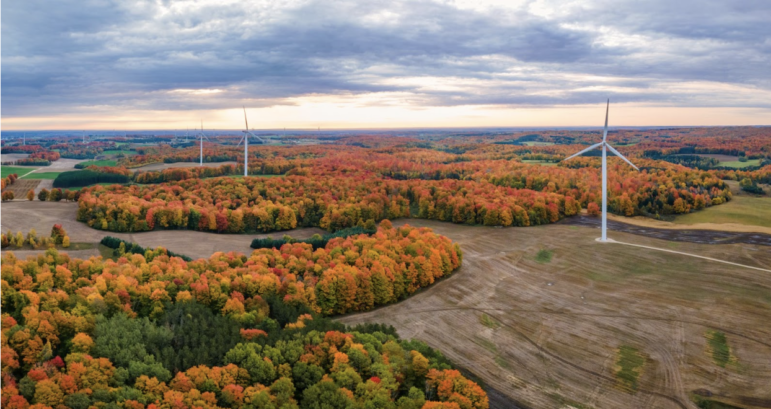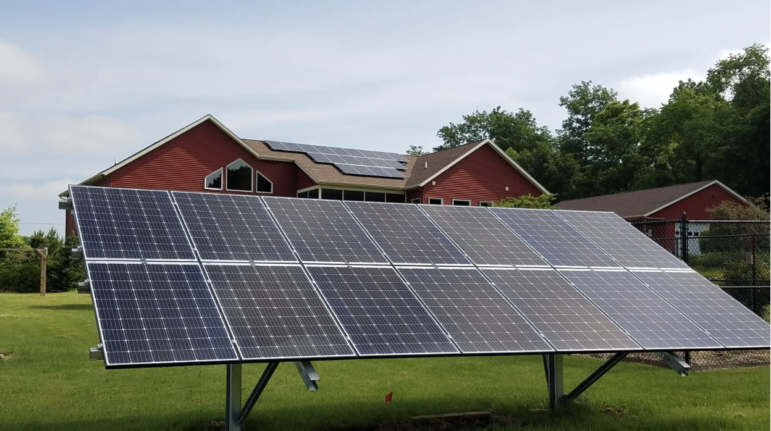
Craig Zerbe
Wind turbines, like these in Cadillac, put Michigan 17th among the states for the share of power generated by wind.By JACK TIMOTHY HARRISON
Capital News Service
LANSING — Energy advocates are seeking to increase Michigan solar and wind power following an average year for the state’s renewable energy production.
In 2022, Michigan ranked 24th across all states in solar electricity generation and 17th in wind electricity generation, according to Governing, a news service that reports on local and state politics.
Renewable energy accounted for only 11% of the total energy generated by the state in 2021 and Michigan ranked in the top 10 states for total energy use in 2022, the U.S. Energy Information Administration reported.
Michigan generates a reasonable amount of solar energy, but there is room for growth, said John Freeman, executive director of the Great Lakes Renewable Energy Association.
“The challenge is that we need to have a slightly better policy framework at the state level to support even further expansion of solar,” Freeman said.
In 2008, the Michigan Legislature established a distribution generation program in the form of renewable energy credits that customers receive for energy produced on their property.
For example, residents that have solar panels on their house, receive around a 50% credit off the retail price of power that the Detroit-based utility DTE Energy charges to customers.
That same law required utilities to issue credits until the total amount of energy generated by customers with renewable forms exceeds 1% of the company’s total energy production.
When that 1% cap is hit, companies are not required to continue giving the credits. Advocates want to increase that cap.
Jackson-based Consumers Energy has voluntarily agreed to lift the cap to 4%, Freeman said. He added that DTE is likely to hit the 1% this summer, having taken longer due to having more customers. The two utilities are the largest in the state.
Removing this cap will save businesses money and “give solar installation businesses the confidence that they’re going to be able to continue to market aggressively to homeowners, farmers and small businesses to get solar,” he said.
The Michigan Public Service Commission asked DTE to submit recommendations for what it might do as it approaches the 1% mark this year, according to Peter Ternes, the company’s corporate communications manager.
As the commission considers next steps, Ternes said DTE, operating over 50 solar and wind parks, will “honor the subsidy that is embedded in the home solar rates through the end of 2023.”
In terms of voluntarily lifting the cap for future consumers, Ternes said the power company is waiting on more information from the commission before deciding.
DTE has developed more wind power due to cheaper costs, Ternes said. But with the cost of solar dropping, the company plans to build out solar even more.
Alternative energy advocates hope for more than just removing the 1% cap.
The Michigan Environmental Council wants to see renewable energy prioritized over natural gas, advocating to close coal plants by 2030, and pass an energy package with 60% of electricity coming from renewable energy by 2030, said Carlee Knott, the group’s energy and climate policy specialist.
The Midcontinent Independent System Operator, known as MISO, has a huge backlog of alternative energy projects it must approve, Knott said. The council wants to streamline that process.
The Michigan Energy Innovation Business Council wants to advance policies statewide for more tax consistency, remove competition and support local communities who host projects, said Laura Sherman, the group’s president.
Wind and solar are still growing, and Michigan leads the Midwest in clean energy jobs, Sherman said. Her group wants to make it easier for homeowners to have solar panels.
Freeman’s group advocates for legislation allowing consumers to buy a portion of solar energy from a shared source if they do not own a home or have limited funds.
Attempts to do that have failed in the past. Sens. Jeff Irwin, D-Ann Arbor, and Ed McBroom, R-Waucedah Township, are trying again.
“I can then subscribe or buy panels, which are located far away from my home, and then however much electricity those panels generate, it then gets credited back to my home bill through my utility,” Freeman said.
The utility companies are focused on larger areas for these solar programs to maximize profits, Knott said. But there is a push to bring them to smaller communities and secure funds for homeowners to retrofit their homes for green energy.
She is more hopeful changes will come this year and said there is a lot of energy behind Michigan’s clean energy movement.
Freeman said he is optimistic because Gov. Gretchen Whitmer pushed the Michigan Healthy Climate Plan, which supports renewable energy, and renewable energy is popular among voters.

Beau Brockett
Advocates hope to raise a cap on the amount of solar power generated from panels like these at an Alto home.